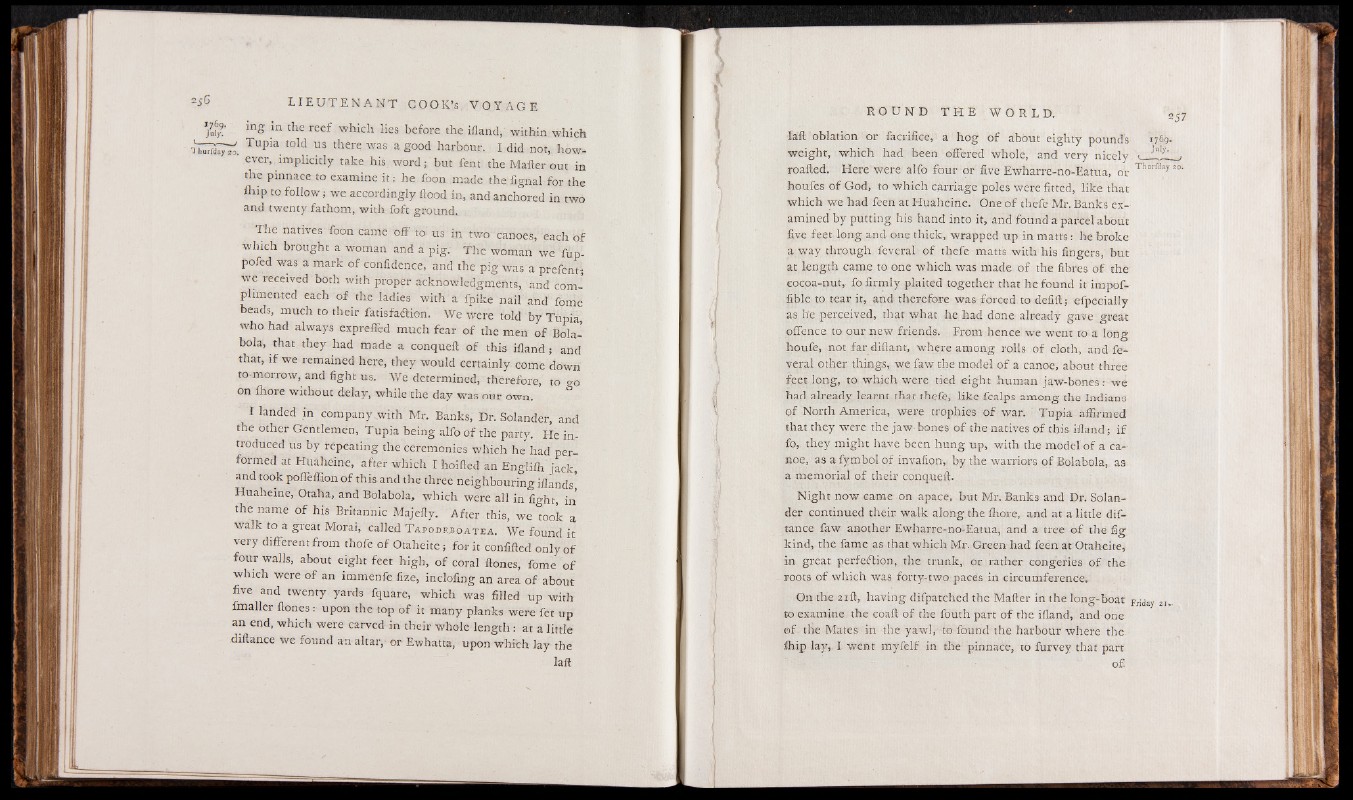
inS in the reef which lies before the ifland, within which
TuPia told us thei'e was a good harbour. I did not, however,
implicitly take his. wor dbut fent the Matter out in
the pinnace to examine it: he foon made the fignal for the
fliip to follow; we accordingly flood in, and anchored in two
and twenty fathom, with foft ground.
The natives foon came off to- us in two canoes, each of
which brought a woman and a pig: The woman we fiip-
pofed was a mark of confidence, and the pig was a prefenr -
we received both with proper acknowledgments, and complimented
each of the ladies with a fpike nail and fome
beads, much to their fatisfaction. We were told by Tupia,
who had always expreffed much fear of the men of Bola-
bola, that they had made a conqueft of this ifland ; and
that, if we remained here, they would certainly come down
to-morrow, and fight us. We determined, therefore, to go
on fhore without delay, while the day was our own.
I landed in company.with Mr. Banks, Dr. Solander, and
the other Gentlemen, Tupia being alfo of the party. He introduced
us by repeating the ceremonies which he had performed
at Huaheine, after which I hoifled an Englifh'jack,
and took pofleffion of this, and the three neighbouring iflands’
Huaheine, Otaha, and Bolabola, which were all in fight, in
the name of his Britannic Majefly. After this, we took a
walk to a great Morai, called T apodeboatea. We found it
very different from thofe of Otaheite; for it confifted only of
four walls, about eight feet high, of coral ftones, fome o f
which were of an immenfe fize, inclofing an area of about
five and twenty yards fquare, which was filled up with
fmaller ftones :■ upon the top of it many planks were fet up
an end, which were carved in their whole length : at a little
diftance we found an altar, or Ewhatta, upon which lay the
laft
laft oblation or facrifice, a hog of about eighty pounds 1769.
weight, which had been offered whole, and very nicely < J'uly' _■
roafted. Here were alfo four or five Ewharre-no-Eatua, or Thurfday 20'
houfes of God, to which carriage poles were fitted, like that
which we had feen at Huaheine. One o f thefe Mr. Banks examined
by putting his hand into it, and found a parcel about
five feet long and one thick, wrapped up in matts: he broke
a way through feveral of thefe matts with his fingers, but
at length came to one which was made of the fibres of the
cocoa-nut, fo firmly plaited together that he found it impof-
fible to tear it, and therefore was forced to defift; efpecially
as h‘e perceived, that what he had done already gave great
offence to our new friends. From hence we went to a long
houfe, not far diftaot, where among rolls of cloth, and feveral
other things, we faw the model of a canoe, about three
feet long, to which were tied eight human jaw-bones; we
had already learnt that thefe, like fcalps among the Indians
of North America, were trophies of war. Tupia affirmed
that they were the jaw-bones of the natives of this ifland; if
fo, they might have been hung up, with the model of a canoe,
as afymbol of invafion,. by the warriors of Bolabola, as
a memorial of their conqueft.
Night now came on apace, but Mr. Banks and Dr. Solander
continued their walk along the fhore, and at a little diftance
faw another Ewharre-no-Eatua, and a tree of the fig
kind, the fame as that which Mr. Green had feen at Otaheite,
in great perfection, the trunk, or rather congeries of the
roots of which was forty-two paces in circumference.
On the 21ft, having difpatched the Matter in the long-boat Friday 2I_
to examine the coaft of the fouth part of the ifland, and one
©f the Mates in the yawl, to found the harbour where the
fhip lay,, I went myfelf in the pinnace, to furvey that part
of